 loading
loading
Before their time Manuscripts & ArchivesGlenn DeChabert ’70 died of lung cancer in 1994. View full imageSo what to do? The first thing, I think, is to make it clear that stress is not in itself a bad thing. I mean, I don't believe Charles was harming himself when—in addition to raising seven children, and practicing medicine and being on the faculty of Morehouse Medical School—he wrote books about ancient religions and conducted regular tours of Egypt. This is what doctors refer to as eustress, or good stress. And that kind of stress can help people live long lives, says Howard S. Friedman, a professor of psychology at University of California–Riverside and coauthor of The Longevity Project: Surprising Discoveries for Health and Long Life from the Landmark Eight-Decade Study. But here's the thing I'm coming to believe: that racial experiences of blacks from a generation ago were significantly more fraught with pain and anxiety than is the case now, especially for those higher up the socioeconomic ladder; and that racial slights had unique debilitating effects on blacks, especially on black males, who were programmed to sense potential infliction of pain even in minor acts of disrespect, or even in the mere approach of, for example, a police officer. This leads to bad, deadly stress. It struck me recently that we of the Class of '70 were barely a century out of America's slavery era when we entered Yale, and the civil rights era was barely beginning to bloom. I am a writer, not a doctor. But I believe that racially based stress, of the kind many black men suffered and still suffer, is akin to a hypertension that becomes fixed in one's system over time, leading to death if it isn't treated. I can only hope that the incredible changes we have witnessed in our society over the past 40 years—and the hopeful signs of our nation's racial advancement, most notably the election of Barack Obama as president—will mean that current and future generations of Yale graduates do not see mortality differentials of the kind we appear to be experiencing now. There is a faith in me that this change will come, and that it is maybe arriving even as I write. Of course, as with anything else, such social improvements require vigilant attention and the hard work of correcting imbalances. For this hard work, I will always honor our brother Clyde Murphy, who set about doing it some 40 years ago, and continued up until the very end.
The comment period has expired.
|
|